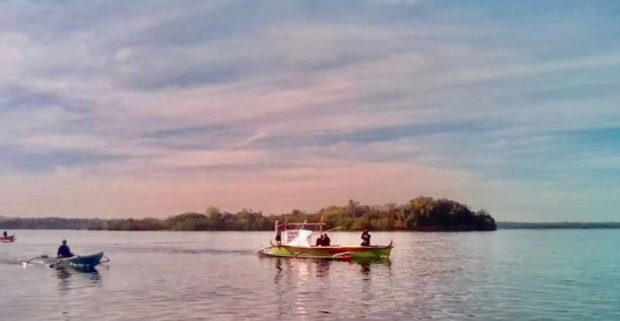Zambales fisherfolk join protests vs reclamation projects

On board their outrigger boats, small-scale fishermen in Masinloc town, Zambales province, take part in a fluvial parade on Tuesday, February 28, 2023, to call for reforms in the fishery sector and protest the reclamation projects in the country, marking the 25th anniversary of the passage of the Fisheries Code of the Philippines. (Photos courtesy of PANGISDA)
SAN ANTONIO, Zambales — Fishermen from this province joined the nationwide protest on Tuesday, February 28, to mark the 25th anniversary of the passage of Republic Act 8550, or the Fisheries Code of the Philippines, which they said failed to alleviate the situation of Filipino fisherfolk.
At least 65 fishermen from the coastal town of Masinloc staged a fluvial parade to protest several reclamation projects in the country that they said were destructive to the environment and their livelihood.
According to Manny De Jesus, chairperson of the fisherfolk group Samahan ng Mangingisda ng Masinloc-Zambales (Sammaza), fishing areas in the country are shrinking because of the destructive activities in coastal areas.
The National Coast Watch Center, an interagency maritime surveillance and coordination unit, recently flagged the illegal activities of Chinese vessels operating dredgers in Manila Bay and rivers in Zambales, where sand is being dredged and transported to the reclamation areas in Manila Bay.
READ: Groups call to defend Manila Bay vs reclamation
De Jesus said the government must further study the country’s fisheries code, adding that small fishermen should be included in the discussion.
Pro-capitalist?
“For us, the law is only in favor of commercial and foreign capitalists,” said De Jesus.
Many fishermen in Masinloc have opted to continue their livelihood within the municipal waters after avoiding the Scarborough Shoal, locally known as Panatag or Bajo de Masinloc.
The shoal used to serve as their traditional fishing ground for years until they began to experience harassment by the Chinese coast guards patrolling the area.
READ: ‘No compromise’ needed with China for Filipinos to fish in West PH Sea – group
In 2012, China seized the shoal, some 20 nautical miles (220 kilometers) from the Masinloc, following a two-month standoff between the Philippine Navy and the Chinese coast guards.
The country challenged China’s sweeping claim in the West Philippine Sea by lodging an arbitration case at the United Nations-backed Permanent Court of Arbitration in The Hague in 2013.
Three years later, or in July 2016, the Hague-based tribunal ruled in favor of the Philippines, invalidating China’s nine-dash line territorial claim over the West Philippine Sea. Despite the tribunal ruling, China rejected the verdict.
Fearful
“According to the stories of some of our colleagues who are still venturing into the West Philippine Sea, they don’t really go near Scarborough Shoal that is being guarded by the Chinese patrols out of fear, despite knowing it is a Philippine territory,” De Jesus said.
Sammaza also called on the government to strengthen the law against illegal fishing, such as the use of dynamite, sodium, and small mesh nets, because the fishing houses, like the corals, were being destroyed, and the small fish lost the opportunity to grow and multiply.
READ: Adverse impact of Manila Bay dredging, reclamation bared
On the same day, the Pangisda-Pilipinas, an organization of small-scale, municipal, and subsistence fishers in the country, staged similar fluvial protests on the shores of Manila Bay, Tayabas Bay and Bataan province, which were joined by over 100 fishing boats.
Pangisda urged fishermen in the country “to defend municipal fisheries against projects that threaten nature and fisheries.”
“Because the destruction of fisheries is the destruction of our nature and livelihood, a threat to food security and our safety,” the group said in a statement.